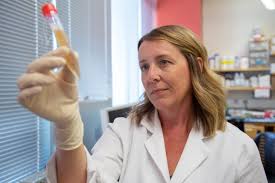Lifelong cytomegalovirus infection may be beneficial, boosting the immune system in old age, when we need it most, according to a study led by University of Arizona researchers published in the Proceedings of the National Academy of Sciences.

Janko Nikolich-Žugich, MD, PhD, co-director or the University of Arizona Center on Aging and chairman of the Department of Immunobiology at the University of Arizona College of Medicine – Tucson.
(Photo: Jason Ryder)
Our immune system is at its peak when we’re young, but after a certain age, it declines and it becomes more difficult for our bodies to fight off new infections.
“That’s why older people are more susceptible to infections than younger people,” explains Janko Nikolich-Žugich, MD, PhD, co-director or the University of Arizona Center on Aging and chairman of the Department of Immunobiology at the University of Arizona College of Medicine – Tucson.
In search of a way to rejuvenate the immune system of older adults, Dr. Nikolich-Žugich and Megan Smithey, PhD, have found that one particular virus may not weaken, but actually enhance our immune system. Their findings are published this week in the Proceedings of the National Academy of Sciences.
For the study, the researchers infected mice with the cytomegalovirus (CMV). The virus affects more than half of all individuals and is contracted, for most part, at a young age. Because there is no cure, the virus is carried for life, and is particularly prevalent in older adults.
“CMV doesn’t usually cause outward symptoms, but we still have to live with it every day since there’s no cure,” Dr. Smithey says. “Our immune system always will be busy in the background dealing with this virus.”
Drs. Smithey and Nikolich-Žugich wondered how this lifelong virus ultimately affects the immune system.

Megan Smithey, PhD
(Photo: UA News)
“We assumed it would make mice more vulnerable to other infections because it was using up resources and keeping the immune system busy,” Dr. Smithey said.
But that’s not what happens.
When infected with listeria, old mice carrying CMV proved to be tougher than old mice without CMV.
“We were completely surprised; we expected these mice to be worse off,” Dr. Smithey says. “But they had a more robust, effective response to the infection.”
The researchers are not certain how CMV strengthens the immune system — they are investigating that in a separate study — but they do believe they have gained new insight into the aging immune system.
“This study shows us that there is more capacity in the immune system at an older age than we thought,” Dr. Smithey says.
When the researchers examined the mice’s T-cells — the army of defenders that fights off infection — they found that both groups of older mice had a decent supply of diverse T-cells.
“Diversity is good,” Dr. Nikolich-Žugich says. “Different types of T-cells respond to different types of infections; the more diverse T-cells you have, the more likely you’ll be able to fight off infections.”
For years, immunobiologists assumed that T-cell diversity decreased as we age. This was one of the reasons why older adults succumbed to disease more easily.
But Drs. Smithey and Nikolich-Žugich’s new study shows that T-cells are almost as diverse in old mice as they are in young mice. The problem is that diverse T-cells are not recruited to the battlefield in older mice — unless they are infected with CMV.
Dr. Nikolich-Žugich explains, “It’s as if CMV is issuing a signal that gets the best defenses out onto the field.”
“This shows that the ability to generate a good immune response exists in old age — and CMV, or the body’s response to CMV, can help harness that ability,” Dr. Smithey adds.
The UA College of Medicine – Tucson team plans to continue to study CMV. It hopes to see similar results in human studies. The team’s ultimate goal is to create a vaccine that can improve the immune system of older adults and protect against infection.
This work was supported by U.S. Public Health Service Grant U54 AI081680 (Pacific Northwest Research Center of Excellence in Biodefense and Emerging Diseases), National Institute of Allergy and Infectious Diseases Grant HHSN27220110017C and National Institute on Aging Grant R01 AG048021 from the National Institutes of Health.
Dr. Nikolich-Žugich also is a member of the UA BIO5 Institute. Dr. Smithey is a research assistant professor who specializes in immunobiology and a member of the University of Arizona Center on Aging.
Other members of the research team included Vanessa Venturi and Miles P. Davenport, Infection Analytics Program, Kirby Institute for Infection and Immunity, University of New South Wales Australia; Adam S. Buntzman, UA BIO5 Institute; Benjamin G. Vincent, Lineberger Comprehensive Cancer Center, University of North Carolina at Chapel Hill; and Jeffrey A. Frelinger, UA Department of Immunobiology.
About the UA College of Medicine – Tucson
The University of Arizona College of Medicine – Tucson is shaping the future of medicine through state-of-the-art medical education programs, groundbreaking research and advancements in patient care in Arizona and beyond. Founded in 1967, the college boasts more than 50 years of innovation, ranking among the top medical schools in the nation for research and primary care. Through the university’s partnership with Banner Health, one of the largest nonprofit health care systems in the country, the college is leading the way in academic medicine. For more information, visit medicine.arizona.edu
About the University of Arizona Center on Aging
The mission of the University of Arizona Center of Aging is to promote long, healthy and functional lives for older adults through comprehensive programs in research, education and training, clinical care and community engagement. The center exists to improve quality of life and to extend the healthspan of older adults. For more information, please visit aging.arizona.edu
About the Department of Immunobiology
The University of Arizona Department of Immunobiology is home to basic research in immunology and microbiology. Its mission is to advance the insights into the biology of microbes and the defense against microbial infections in order to develop future therapies for infectious, autoimmune and malignant diseases. For more information, please visit immunobiology.arizona.edu
Contact: Nadia Whitehead, 915-276-6803, nwhitehead@email.arizona.edu
July 3, 2018
